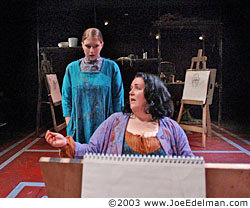
Scenes from an Execution
Howard Barker, a contemporary British playwright, has been called the author of the theatre of catastrophe. He has written over 50 plays that have been performed on stage, radio, television, and in the movies. One of his greatest plays, "Scenes from an Execution," was originally written as a radio play. It was first performed on BBC radio in 1984 with Glenda Jackson as Galactia. This play conceptualizes the perpetual clash of the artist versus the state.
The first stage performance was in 1986 at the Almeida Theatre. The American premier of this play took place in 1992 at the Mark Taper Forum, directed by Robert Allen Ackerman. Of the few performances in this play's history, it was the winner of two LA Weekly Awards when the Zoo District produced the play in 1999. 1999 was an important year for this play. Also in 1999, the RSC performed it at the Barbican Pit and Howard Barker's theatrical company, the Wrestling School, performed it, starring Kathryn Hunter.
Our performance is directed by Jim Peck, and features Devon Allen starring as Galactia. Due to the text-based style and the complicated nature of the play, the first week of rehearsals was spent digging deep into the meanings of each scene. This play was very fragmented; scenes were short and jumped around. Galactia spends only five of the twenty scenes offstage, thus the audience sees the many emotional changes she goes through. The play itself was set between two sides of audience so that the stage could have both ends free for the formula of art vs. the state to be played out as two opposing dramatic images.
Over ten weeks of rehearsals this play was formed to show the transition of a piece of art and how it can be used against even itself. Galactia was hired by the state to paint the Battle of Lepanto, however, the artist and the state had different opinions about what this battle entails. Is it the greatest triumph of Venetian history or a slaughter of bodies during a battle at sea? One could argue both ways, and the painting is even presented in such a way as to defend both sides of the argument.
This play is scary and funny and moving. Many of its implications are limitless. Should we believe the state mantra that "in art nothing is what it seems to be, but everything can be claimed?" Or does Galactia have it right after all, "The act of painting is an act of arrogance... To paint is to boast, and if you don't like boasting you ought not to paint?" Make up your own minds, or don't choose; we can never be sure who will win in the end.
